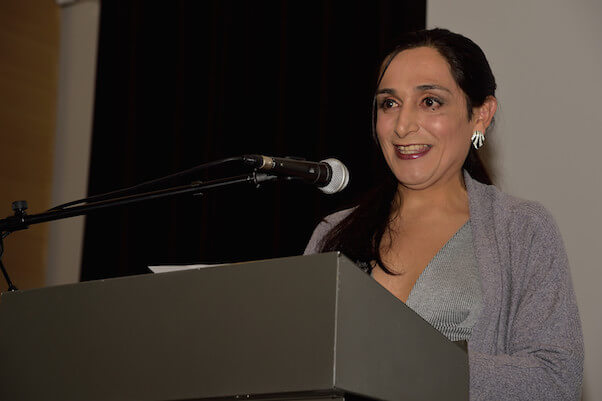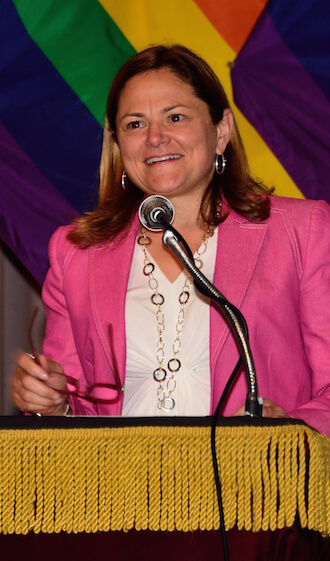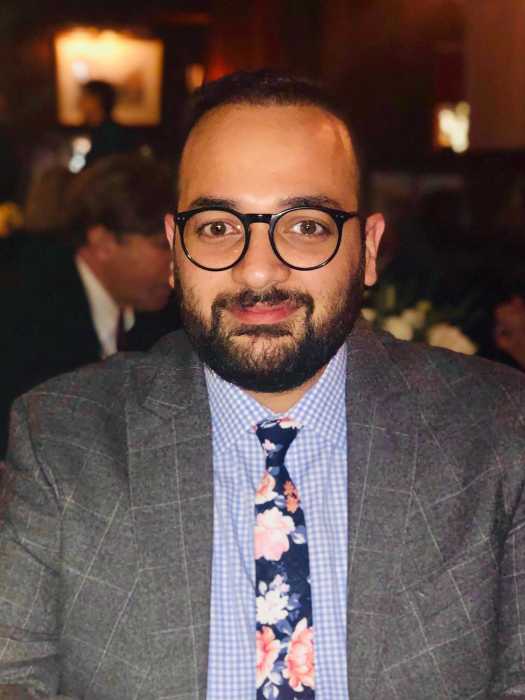Sheldon Rogers hopes to pursue a music career and plays guitar as part of his worship leadership at Forefront Manhattan, an LGBTQ-affirming congregation that holds its services at the LGBT Community Center on West 13th Street. | JENNA PINCHBECK
BY NATHAN DiCAMILLO | Every summer at church camp, Sheldon Rogers asked God to fix him.
“I would spend my days praying away the gay and my nights fantasizing about my counselors,” Rogers said. “Freud would have had a field day with me.”
Camp was where kids went to renew their faith but also to be “delivered from demons.”
One girl went up before her fellow campers to be delivered from “sexual impurity,” which was code for premarital sex. After 20 minutes of the group praying in tongues face down on the carpet and shaking, she vomited. Not surprisingly, the environment was toxic for Rogers. He never felt compelled to ask to be delivered from homosexuality in this way.
Sheldon Rogers still sings in church, as a voice for welcoming LGBTQ people into the fold
“Looking back, I think that was God’s way of looking out for me,” he said. “I don’t think I was ever convicted to be delivered from it because I feel like that was God’s way of saying I didn’t need to be.”
Now, Rogers is one of the most active church-going people in his extended Southern family. He’s a worship leader at Forefront Manhattan Church, a LGBTQ-accepting church in the West Village, and also the social media and outreach director for Grafted NYC, a non-profit that connects LGBTQ Christians with each other. At 31, he works full-time at a reality TV production company while pursuing a career in music.
Rogers has been in the church for most of his life but was only able to be open about his sexuality in a church when he came to New York and joined Forefront Manhattan.
He grew up on a farm in Waxhaw, North Carolina, a small town with less than 10,000 people. Part of the “Southern community mentality” in Waxhaw was the unspoken code about things polite Christians didn’t talk about: sex, drugs, alcohol, smoking.
So when his mother, Paula Rogers, found a picture of a male model among her son’s things and asked him if he was gay, he didn’t want to talk about it.
“I brushed it off, and I was like, ‘Mom it will never happen again,’” he said. “It obviously kept happening.”
Rogers’ mom knew before her son did what it was like to be shunned by the church. When she divorced her husband, she was told not to come on Sundays anymore.
Second in a series on Religion & LGBTQ Life
Rogers was always best friends with his mom. He felt ashamed of being different than his brothers and cousins. He didn’t like to play basketball at family reunions. He loved theater and the arts. When he was eight, she was usually the one who drove him to auditions.
“We always sang together in the car,” he said. “When I was young we actually tried to form a mother and son country gospel duo…. She would always sing us lullabies.”
He came out to his mom when he was 23 years old. He was in a relationship with a man whom he thought he might marry and felt it would be a disservice to not tell his family.
He sat down by her bedside late one night.
“I was like, ‘You might have noticed I’ve been talking a lot on the phone with someone,’” he said.
“Yeah, I have,” she replied.
“I’m dating somebody.”
“Okay… Is this somebody a boy or a girl?”
She didn’t waste any time.
He hesitated. “It’s a boy.”
“Okay.”
“I don’t know how you feel about this, but I care about this person,” he said. “I want him to be a part of my life, and I want him to be a part of your life if that’s okay.”
She paused.
“Sheldon, when you become a parent, the only thing you ever want in your life after that moment is for your child to be happy,” she said. “You want to protect them from everything that will make them feel bad and you want to keep them safe from anything that might harm them, but most of all you want them to be happy… Are you happy?”
“Yeah, Mom, I’m really happy,” he said.
“That’s all I want,” she said.
They sat in silence. She sat upright in her bed.
“So what’s his name? Where’s he from? Is he cute? Do you have any pictures?”
These moments were few and far between for Rogers. After college, he lived in Minnesota for a year, worked at Hersheypark in Lancaster, Pennsylvania for a few years, and moved to New York in October 2013.
“I wish I would have cherished that moment a little more,” he said. In February 2015, Roger’s mom died suddenly of a pulmonary embolism.
“We just understood each other,” he said. “She was always my biggest supporter. We had a much stronger relationship than I had with my dad or stepdad.”
Roger’s mom nurtured her son’s talent. She knew he loved to sing since he was very young. One Sunday when he was three, Rogers crawled under the pews at church to sing all the lyrics of “I Have Decided to Follow Jesus” in front of the whole congregation.
“He has been singing his entire life,” Candace Pappas, who’s known Rogers since they both were five-years-old in Waxhaw, said. Pappas and Rogers sang in choir together in middle school and both went to Catawba College in Salisbury, North Carolina.
Pappas saw Rogers get teased a lot for being different growing up.
“I was like, ‘this is garbage,’” she said.
Theater and music was one of the ways he could escape.
Pappas has seen him gain confidence since coming out.
“He owns himself now,” she said. “He’s so much happier and less guarded.”
He now works hard to devote time to music while balancing his full-time work and hopes to release some original music next year and collaborate with friends.
He has been a worship leader for his church for almost a year — a position he would have been denied in the churches he went to growing up.
“Forefront has been unapologetically affirming for a couple of years now,” Rogers said.
Rogers helped his pastor, Travis Eades, and other Forefront Manhattan staff learn how to serve the LGBTQ community in a way that wasn’t alienating.
Justin Nieto met Rogers through Grafted NYC and was inspired by seeing another Christian who was gay stand up for LGBTQ rights within the church.
“He was really adamant about creating opportunities to use his voice and to move forward with this issue,” Nieto said. “He’s been a real pioneer in his church.”
Eades also came out of a Southern evangelical background.
“I also had a hard time with a lot of the aspects of my religious upbringing, and the way we treated people,” Eades said. Rogers experienced the treatment that Eades had only observed, and the church benefits from his experience.
“He helped us understand how we can avoid tokenizing our LGBTQ brothers and sisters,” Eades said.
Rogers is honest but not abrasive.
“He has learned to be completely laser focused honest with what he thinks and feels,” Eades said. “But he will offer that up in a gracious and articulate way.”
Because of budgeting issues caused by losing financial backing because it is affirming of LGBTQ people, the church has moved to the LGBT Community Center at 208 West 13th Street.
“I was very surprised by that,” Rogers said. “I wasn’t sure whether it would polarize our congregation too much.”
Rogers’ leadership has been a critical part of Forefront’s ministry to LGBTQ people, and serving in an affirming church has been a dream he’s had for a while.
Now, he fulfills that dream every Sunday.
“I didn’t think about how members would think about having a gay worship leader,” Rogers said. “I just knew that my church needed my help.”
This is the second in a series of features by Nathan DiCamillo on Religion & LGBTQ Life. The first feature is here.





































